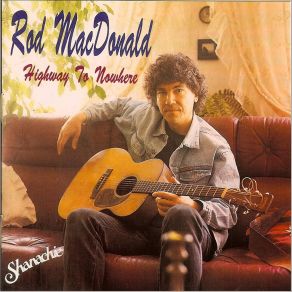Highway To Nowhere
Download links and information about Highway To Nowhere by Rod MacDonald. This album was released in 1992 and it belongs to Rock, World Music, Songwriter/Lyricist genres. It contains 11 tracks with total duration of 44:54 minutes.

|
|
|---|---|
| Artist: | Rod MacDonald |
| Release date: | 1992 |
| Genre: | Rock, World Music, Songwriter/Lyricist |
| Tracks: | 11 |
| Duration: | 44:54 |
| Buy it NOW at: | |
| Buy on iTunes $9.99 | |
Tracks
[Edit]| No. | Title | Length |
|---|---|---|
| 1. | Norman (feat. Yes) | 4:07 |
| 2. | Now That the Rain Has Gone (feat. Yes) | 3:38 |
| 3. | The Coming of the Snow (feat. Yes) | 5:00 |
| 4. | Moonlight and Fire (feat. Yes) | 3:35 |
| 5. | After the Singing (feat. Yes) | 4:59 |
| 6. | So Many Songs (feat. Yes) | 4:12 |
| 7. | Love At the Time (feat. Yes) | 3:20 |
| 8. | Distant Radios (feat. Yes) | 2:39 |
| 9. | Saving Grace (feat. Yes) | 3:59 |
| 10. | The Well (feat. Yes) | 3:31 |
| 11. | The Way To Calvary (feat. Yes) | 5:54 |
Details
[Edit]Shanachie Records' 1992 Rod MacDonald collection Highway to Nowhere is a reconfigured version of the singer/songwriter's 1989 album Bring On the Lions, released by the Swiss Brambus Records label. Thus, even though nine of the 11 tracks appeared previously on that 13-track album (the only new songs being "Moonlight and Fire" and "The Way to Calvary"), the material is being given its U.S. debut on Highway to Nowhere. The title is drawn from the chorus to the lead-off song, "Norman," MacDonald's first-person evocation of the mentally disturbed main character in the 1960 Alfred Hitchcock thriller Psycho, who runs a motel that has been bypassed by a new highway. Its use as the overarching image of this collection says something about the point of view of the songwriter, a veteran in his early forties who has made his way performing on the road while issuing three albums on small labels, his popularity in Europe indicated by the association with Brambus and the inclusion of "The Coming of the Snow," recorded live in Italy. ("After the Singing," meanwhile, was recorded live for the West Virginia radio series Mountain Stage.) Singing calmly in his high tenor, usually accompanied by his own acoustic guitar and occasional harmonica, a rhythm section, keyboard player Margo Hennebach, and violinist Lisa Gutkin, MacDonald achieves a chamber pop folk style on a series of sadly reflective songs in which, using poetic language to distance himself somewhat from the subject matter, he nevertheless questions his purpose. These are the songs of a man drifting from town to town and woman to woman, increasingly regretful and wondering, in "The Coming of the Snow" (a tune similar in theme to Bob Dylan's "Girl From the North Country") and "Love at the Time," whether he hasn't made romantic mistakes and, in "So Many Songs" and "The Well," what his artistic pursuits are accomplishing. In two songs, he even refers to himself as a slave. But the very quality of his writing and singing, particularly on the imagistic "After the Singing," belie his doubts, at least about his art, and in fact MacDonald showed no signs of quitting at this point.